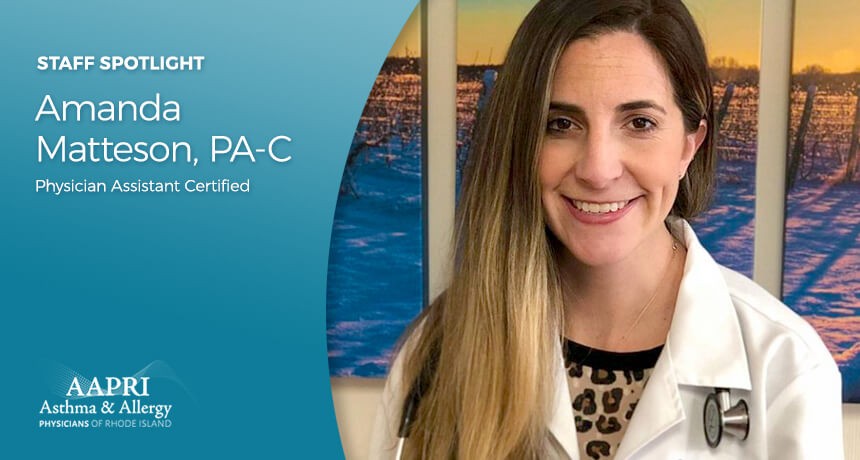At AAPRI and the Center for Functional Medicine, our dedicated team of healthcare professionals is here to provide you with personalized care to help you live a healthier life. “I treat all of my patients as if you’re a family member,” says Physician Assistant Amanda Matteson. “I take the time to listen, and I do my best to help you understand what’s going on in your body.” In this staff spotlight, you’ll hear more from Amanda who recently moved into a new role as Director of the Center for Functional Medicine.

Q: Tell us about what you do and how you approach your work.
AM: I’ve been with AAPRI for about 16 years. As a Physician Assistant, I see patients of all ages in the allergy and asthma side of the practice. I’ve also been a part of the research department. Earlier this year I moved over to the functional medicine side of the practice where my focus is on getting know the whole patient so I can be part of their journey to better health and quality of life. A few months ago, I became the director of the functional medicine program where I work alongside Dr. Z who oversees it all, and Yoko Kawashima, our health coach.
Q: How is the functional medicine approach different?
AM: Patients who come to the Center for Functional Medicine benefit from having a coordinated team providing their care. I meet with Dr. Z and Yoko every week to discuss what’s going on with every patient. Our focus is on healing a person through diet and other lifestyle changes. We say throughout the functional practice that “food is medicine” because really what we’re eating and consuming on a daily basis affects our health. So instead of simply prescribing medication to make the symptoms go away, we look for the root cause. A lot of what we do is based on making dietary and other lifestyle changes.
While our traditional asthma and allergy side of the practice is insurance-based, the functional medicine program is not covered by insurance. We do our best to try to keep out-of-pocket costs as low as possible and some of our lab work is covered by insurance. What’s important to remember is that functional medicine isn’t about simply prescribing medication to treat symptoms. It’s about getting at the root cause of the symptoms, looking at the body as a whole and understanding how it’s all interconnected.
Q: How does the functional medicine program work?
AM: It’s actually a program that’s tailored to each individual patient. Over the course of at least a year it includes a series of meetings with members of the care team. It includes extensive lab work and testing—often we recommend an elimination diet, for example—so we can get at the core of what’s happening in your body. It includes health coaching so that you are fully supported along the way. It requires a commitment from the patient to give it the necessary time to work. Making dietary and lifestyle changes is extremely effective, but it takes time. It’s a gradual process.
Q: What are the main health issues you see on the functional medicine side?
AM: Hormonal imbalances play a key role in nearly everyone’s problems. Whether it’s a thyroid issue or another hormonal imbalance (progesterone, estrogen, testosterone, etc.), it’s like a domino effect that causes other problems in the body such as hypertension, diabetes, anxiety, depression, seasonal allergies, and asthma. There are a lot of estrogen-rich foods in our diet, and even in products outside of what you eat such as pesticides and plastics. All of this exposure can cause our bodies to get out of whack. Our job is to figure out exactly what’s happening so we can create a plan to fix it.
Q: Explain a bit more what you mean by treating the “whole patient.”
AM: We begin by listening to the patient’s concerns—what are you feeling about yourself? What are you unhappy with in your life? There’s a huge mental, emotional, and spiritual component to the healing process and we make time to explore that and incorporate it into the treatment plan.
Q: How do you convince people to make their health a priority?
AM: Sometimes people look at the cost of our functional medicine program and they think it’s so much money, but they don’t realize how they’re already paying a lot of money through insurance premiums, copays, prescription drugs—and all of this stuff is for care that’s not focused on the root cause. My goal is to help patients see that they’re worth it. If you’re feeling lousy all of the time, how are you going to enjoy life? It’s really that simple.
Let your journey to better health start today. Contact us to schedule a consultation with Amanda or any of our other dedicated team members at one of our three office locations.

